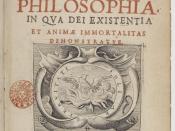Descartes was possessed by an extreme desire to distinguish truth from falsehood. In his admiration of the sheer clarity of mathematics, Descartes wanted to construct an indestructible system of beliefs established on principles of absolute certainty. Perfect knowledge is that which cannot be doubted, indubitable, "clear and distinct" ideas, and a type of knowledge that is incorrigible, such as the knowledge of one's own mental life. Descartes considered what seemed to be immediate experience as indubitable knowledge - such as sensations, thoughts, feelings, or desires.
In the First Meditation, Descartes desired to bring about a "demolition" of his beliefs, especially those beliefs he gained from the senses. In order to do so he expressed a skeptical attitude towards his beliefs by adopting a method of universal doubt, or in covert academic circles, "methodological skepticism." It is universal, given that it applies to every proposition of truth or falsehood, and it is a method, a tool to arrive at certainty.
As a principle of epistemology, methodological doubt is a Ginsu knife that whets away substandard belief from a body of knowledge, or any kind of belief that affords even the slightest doubt about it. When a belief passed the test of universal doubt, Descartes thought he had achieved perfect knowledge. In his bold quest for a revolution in philosophy, Descartes had to overcome the skeptic by using his mightiest weapons against him.
In the First Meditation there are three levels of skeptical arguments Descartes employs in order to achieve the epistemological project of perfect knowledge. After the first two skeptical arguments, the illusion and the dream arguments, Descartes presented the ultimate skeptical argument in philosophy - the omnipotent deceiver hypothesis. The omnipotent deceiver is an all-powerful demon who "perpetually torments" Descartes with error, deceive him with false beliefs and encourage...



Title too vague
The title was too vague. Cartesion Mythology could be anything not just a story about Descartes.
0 out of 0 people found this comment useful.